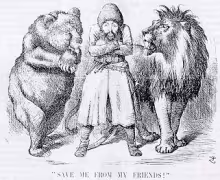Back in the 1800s, the Brits were very wary of the Russian Empire's thirst for expansion. They were particularly concerned of possible Russian plans to move further south to lay their hands on the jewel of the British Empire, India. As a result, intelligence gathering and strategy became critical for both sides as they attempted to outmanoeuvre each other. Afghanistan turned into a crucial buffer for the British who launched three wars against the Afghans to curb any Russian advances towards India.
A young intelligence officer of the British East India Company's Sixth Bengal Light Cavalry named Arthur Conolly is said to have coined the term 'The Great Game' to refer to the tactical and diplomatic jousting throughout Central Asia at the time. It was later made popular by Rudyard Kipling through his extensive use of the term in his novel, Kim.
The Great Game is regarded to have extended from the Russo-Persian Treaty of 1813 to the Anglo-Russian Convention of 1907 and resumed again after WW1. The Cold War is often considered to be 'The Great Game II'.


